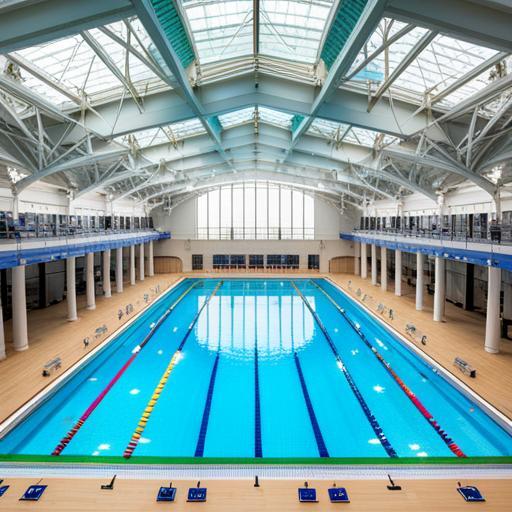


Swimming pools are more than just refreshing oases on hot days; they are hubs of relaxation, exercise, and socialization. From serene backyard retreats to expansive community centers, swimming pools offer a multitude of benefits for individuals of all ages. In this comprehensive guide, we'll explore the world of swimming pools, providing insights into their different types, maintenance tips, and suggestions for maximizing your aquatic experience.
Understanding Different Types of Swimming Pools:
Swimming pools come in various shapes, sizes, and designs, catering to different preferences and purposes. Residential pools, lap pools, infinity pools, and community pools each serve unique functions, and understanding these distinctions can help you choose the right pool for your needs.
Backyard Bliss: Residential Swimming Pools:
Residential pools are the epitome of backyard bliss, providing a private sanctuary for relaxation and recreation. Consider factors such as pool size, shape, and landscaping when designing your backyard oasis. Options like saltwater pools or heated pools add extra layers of comfort and enjoyment.
Lap Pools for Fitness Enthusiasts:
Lap pools are specifically designed for swimmers seeking a more structured exercise environment. These pools are typically longer and narrower, facilitating continuous laps. Lap pools are ideal for individuals who prioritize fitness and enjoy the rhythmic benefits of swimming laps.
Infinity Pools: A Visual Delight:
Infinity pools, also known as vanishing edge pools, create a stunning visual effect where the water appears to extend infinitely. These pools are often built in elevated locations, offering breathtaking views. The design adds a touch of luxury and aesthetics to the swimming experience.
Community Pools: A Gathering Hub:
Community pools serve as gathering hubs for families, friends, and neighbors. These shared spaces often include amenities like slides, diving boards, and recreational areas. Community pools provide a social atmosphere, fostering connections and a sense of community.
Children's Pools: Safe and Playful Spaces:
Children's pools are shallow, safe havens designed for younger swimmers. These pools often feature water play elements, fountains, and interactive features, creating a playful environment for kids to enjoy while learning to swim.
Maintenance Tips for Crystal-Clear Water:
Maintaining a swimming pool requires regular care to ensure clean and clear water. Skim the surface for debris, regularly check and balance water chemistry, and invest in a quality pool filter and pump. Regular vacuuming and brushing prevent algae growth and maintain pool surfaces.
Pool Safety: A Top Priority:
Pool safety is paramount for a worry-free aquatic experience. Install pool fencing with a self-latching gate, designate a responsible adult as a lifeguard during gatherings, and ensure that everyone in the family or community is familiar with basic water safety rules.
Water Conservation in Pools:
Responsible water use is crucial, especially in regions facing water scarcity. Consider implementing water conservation measures, such as using pool covers to reduce evaporation, fixing leaks promptly, and exploring eco-friendly filtration systems.
Hydrotherapy and Wellness Pools:
Hydrotherapy pools offer therapeutic benefits, promoting relaxation and aiding in physical recovery. These pools often incorporate features like jets, warm water, and specific designs to enhance the healing experience. Explore wellness pools for a holistic approach to health and well-being.
Hosting Poolside Events:
Make the most of your swimming pool by hosting poolside events. From casual barbecues to themed parties, a well-maintained pool area can be a versatile space for entertaining friends and family. Consider adding comfortable seating, ambient lighting, and water-friendly games for added enjoyment.
Seasonal Pool Care:
Adjust your pool care routine based on the seasons. In colder months, consider winterizing your pool to protect it from freezing temperatures. During the warmer seasons, pay extra attention to water balance and filtration to accommodate increased pool usage.
Swimming is a popular sport that involves propelling oneself through water using various strokes and techniques. It is a great form of exercise that offers numerous physical and mental benefits. Here are some aspects of swimming as a sport:
Physical fitness: Swimming is an excellent cardiovascular workout that strengthens the heart and lungs, improves endurance, and burns calories. It also engages all major muscle groups, including the core, arms, legs, and back.
Technique: Swimming requires mastering proper stroke techniques, such as freestyle, breaststroke, backstroke, and butterfly. The proper technique not only improves performance but also reduces the risk of injury.
Competition: Swimming is a highly competitive sport with various levels of competition, from local swim meets to international events like the Olympics. Swimmers compete in various distances and strokes, with each stroke requiring different techniques.
Mental toughness: Swimming can be mentally challenging, especially during long-distance events. Swimmers must learn to manage their breathing, stay focused, and maintain mental toughness to push through physical fatigue.
Teamwork: Although swimming is an individual sport, swimmers often compete as part of a team. Teammates can offer support, motivation, and feedback, and the team aspect of the sport can promote a sense of camaraderie and sportsmanship.
Safety: As with any water-based activity, safety is a significant concern in swimming. Swimmers must be aware of water conditions, practice proper water safety, and be supervised by a trained professional when necessary.
Swimming pools and water sports are popular recreational activities enjoyed by people of all ages and abilities around the world. Here are some details about these activities:
Swimming pools:
Swimming pools are typically constructed with a combination of concrete, tiles, or fiberglass.
The water in swimming pools is usually treated with chemicals like chlorine to maintain cleanliness and hygiene.
There are various types of swimming pools, including indoor and outdoor, heated and unheated, and saltwater or freshwater.
Swimming is an excellent form of low-impact exercise that provides a full-body workout, improves cardiovascular health, and can relieve stress.
Swimming pools are used for a variety of activities, such as lap swimming, recreational swimming, swim lessons, and aquatic therapy.
Water sports:
Water sports encompass a wide range of activities that take place in or on the water, such as surfing, sailing, waterskiing, wakeboarding, and kayaking.
These activities can be enjoyed in lakes, rivers, oceans, or man-made water bodies like water parks and swimming pools.
Water sports can be competitive or recreational, and some require a high level of physical fitness and skill.
Many water sports require specialized equipment, such as surfboards, sailboats, water skis, or kayaks, and proper safety gear like life jackets.
Participation in water sports can provide numerous benefits, including improved cardiovascular fitness, muscle strength, balance, and coordination.
Swimming pools and water sports are popular activities that offer many physical and mental health benefits. Whether you are looking for a relaxing dip in the pool or an adrenaline-fueled adventure on the water, there is a water-based activity to suit your interests and abilities.
There are several types of swimming pools, each with its own unique features and benefits. Here are some of the most common types:
In-ground swimming pools: These are the most popular and permanent types of swimming pools that are built into the ground. They are made of concrete, vinyl, or fiberglass and come in various shapes and sizes, ranging from basic rectangular or circular shapes to more elaborate designs.
Above-ground swimming pools: As the name suggests, these pools are installed above ground and are a more affordable option compared to in-ground pools. They are typically made of steel, aluminum, or resin and come in round or oval shapes.
Indoor swimming pools: Indoor pools are built inside a building, such as a home, hotel, or fitness center. They are typically heated and can be used year-round, regardless of the weather outside. They can be made of various materials, including concrete, tile, or fiberglass.
Infinity pools: Also known as vanishing edge pools or negative edge pools, these pools give the illusion of an edgeless pool that blends seamlessly with the surrounding landscape. They are typically built on a hill or slope, and the water flows over the edge into a catch basin below.
Natural swimming pools: Natural swimming pools, also called eco-pools, are designed to resemble a natural pond or lake. They use plants, rocks, and other natural materials to filter and clean the water, eliminating the need for chemicals like chlorine.
Saltwater swimming pools: These pools use a saltwater chlorination system to keep the water clean and safe for swimming. They are gentler on the skin and eyes than traditional chlorine pools and require less maintenance.
Before going to the swimming pool, there are a few things you should know and prepare for:
Know the pool rules: Familiarize yourself with the rules of the swimming pool. This can include things like whether or not you are allowed to bring in outside food or drink, the appropriate swimwear to wear, and any other safety guidelines.
Check the weather: Make sure the weather is appropriate for swimming. If it's too cold or rainy, it may not be safe to swim.
Bring appropriate swimwear: Make sure you have the appropriate swimwear, such as a swimsuit or trunks, a towel, and flip-flops or sandals.
Apply sunscreen: Protect your skin from the sun's harmful rays by applying sunscreen with a high SPF.
Hydrate: Drink plenty of water before and during your swim to stay hydrated.
Shower before entering the pool: Showering before entering the pool can help remove dirt, sweat, and other contaminants from your body, which can help keep the pool clean.
Check your health status: If you are feeling unwell or have any open wounds, it's best to avoid swimming as you may risk infecting yourself or others.
Swimming pools are more than aquatic retreats; they are spaces for exercise, relaxation, and community building. By understanding the different types of pools, prioritizing maintenance, ensuring safety, and exploring innovative pool features, you can create a haven that enriches your life and promotes well-being. Dive into the blissful world of swimming pools, where every splash is a celebration of health, joy, and the sheer pleasure of aquatic living.
Warm regards,

We use cookies
We use cookies and other tracking technologies to improve your browsing experience on our website, to show you personalized content and targeted ads, to analyze our website traffic, and to understand where our visitors are coming from. Privacy Policy.